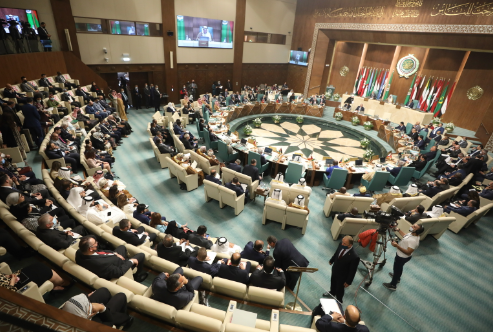CURRENT AFFAIRS UNIT, RADIO KWARA, ILORIN
PROGRAMME: NEWS COMMENTARY
DATE OF BROADCAST: 25/5/89 AT 1810 HOURS
WRITER: LANRE KAWU
This week, Arab leaders have converged in the Moroccan resort city of Casablanca, for an extraordinary summit conference of the Arab League. The summit was convened to examine two of the most important problems facing the Arab world. These are the 18-month-old Palestinian Uprising, or Intifada, and the continuing carnage in Lebanon.
The Palestinian Intifada has focused worldwide attention on the central position of the Palestinian people in the whole vortex of the Middle East; while at the same time, exposing the truly aggressive nature of the Zionist Israeli state. Beyond that, it demonstrated the power of the collective resolve of the Arab Palestinian people, more than the tanks and airplanes of the Arab Armies taken together.
On the other hand, the past one month or so, has witnessed an upsurge in the cycle of violence in the Lebanon. A carnage that is fourteen years old, and which has destroyed the, once most prosperous country, of the Middle East. The latest round of fighting, which is described as one of the most ferocious for years, came in the wake of the division over who is the legitimate President of the country, General Michel Aoun of the Christian factions or Salim Hoss of the Muslims.
The summit’s opening produced its own magic. That was the re-admission of Egypt into the Arab League, after ten years of absence. She had been expelled in 1979, when President Anwar Sadat signed the Camp David Accords, which opened diplomatic relations with the leading foe of the Arab nation, Israel. For the Arab nations, at least in public, Egypt needed to be vigorously condemned and isolated. So, for ten years, the most populous and most powerful Arab nation, was excluded from all the major issues and forums that concerned the Arab world.
But there have been moves in the direction of reintegration of Egypt, over the past few years. The coming into power of Hosni Mubarak, at least offered one of these first steps. This was tied to other developments in the region. Above all, there was the Israeli aggression against the Lebanon in 1982, which led to the removal of Palestinian fighters from that country. Yasser Arafat on leaving, went to hold a much-publicised discussion with Mubarak, to the annoyance of leaders of the Steadfastness and Confrontation Coalition-Algeria, Syria, Libya and People’s Yemen.
The other issue was the Iran-Iraq war. Egypt supplied the Iraqi side with a lot of military hardware, while at the same time, gaining a lot of political capital, from the apprehensions of the Arab Gulf States- Kuwait, Saudi Arabia, etc. These nations had put a lot of their resources at the disposal of Iraq, to forestall its defeat by the much larger Iranian forces. They were also afraid of the export of the Iranian revolution and its example, to their countries.
As a result of these factors, Egypt became more and more acceptable as a big brother, inspite of the continued adherence to the Camp David sell out. What followed, was the restoration of the diplomatic links severed in the wake of Camp David, by the conservative regimes. Before long, even the radical states like Algeria and South Yemen followed. As the Arab leaders convene in Casablanca this week, only Libya and war-torn Lebanon, are yet to restore official links with Cairo. But even Colonel Gadhafi is attending the summit meeting.
The past year has seen a lot of dramatic changes in the Arab world. These include the ending of the Gulf War which took over one million lives on both sides, and hundreds of billions of dollars, in economic ruins. Then there was the rapprochement in the Maghreb. In that region, the regime of the senile Tunisian President Habib Bourguiba was ended, and it brought in his stead, the more youthful and more vigorous Zin Abadin Ben Ali. While provisional steps for a peaceful settlement of the conflict in the Western Sahara, were also taken. These steps were sealed with the summit of the Maghreb leaders, which proclaimed the Maghreb Union.
Clearly, the Arab world feels much more confident about being able to tackle its problems. This confidence must have been at the basis of the extraordinary summit holding this week in Casablanca. Will the Arab leaders be able to work out the magical formula to end the 14 years of bloodshed in long-suffering Lebanon? What concrete steps are they going to take, to aid the successful continuation of the Palestinian Intifada? It remains to be seen, when all is said and done.
However, it must dawn on the leaders, that this is an opportunity they cannot afford to lose. They owe a successful resolution of the internecine conflicts of their part of the world to the Arab people, and their friends and allies, in different parts of the world.


